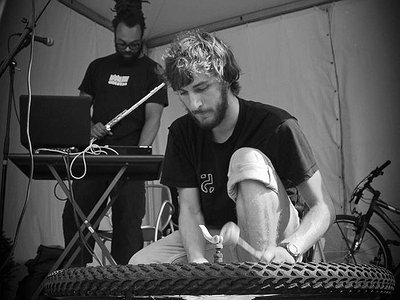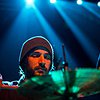Purportedly, John Stevens of the Spontaneous Music Ensemble had two basic rules to playing in his ensemble: (1) If you can't hear another musician, you're playing too loud, and (2) if the music you're producing doesn't regularly relate to what you're hearing others create, why be in the group. What's your perspective on this statement and how, more generally, does playing in a group compare to a solo situation?
It's a good thing to keep in mind that you should contribute to the groups' sounds and allow for others' contribution, in most settings. Rules are made to be broken though, everyone is always trying to define musicality, which only confines it more. As for group playing versus solo: those are different worlds! Solo is harder for me; you don't have anyone to bounce ideas off of or rely on.
With more and more musicians creating than ever and more, what does this mean for you as an artist in terms of originality? What are some of the areas where you currently see the greatest potential for originality and who are some of the artists and communities that you find inspiring in this regard?
I don't really think about originality too much. You know it when you hear/see it. There is always room for creativity, and even though it can seem like it's all been done before, it hasn't.
What constitutes a good live performance in your opinion and what’s your approach to performing on stage? How do an improvisation and the recording of this improvisation compare?
Live music is super special. I probably don't have to state that to the people who are reading this! Obviously what makes a good live performance is subjective. What's interesting to me is how performers and listeners can have completely different feelings about or recollection of a performance. Like, were we just in the same room hearing the same thing? Because I felt completely the opposite about it... that's cool!
For me, one way a performance can be good is when it's transporting. Another way could be that I like the vibe of the performers, their song-writing, or just one funny thing that happened. My approach to performing might be to transport the listeners. I like when there is enough space in music for people to have their own thoughts/experiences, rather than beat them over the head with something contrived. About recordings: sometimes it's really like 'you had to be there.' Recording is a separate magic in itself.
Listening is also an active, rather than just a passive process. How do you see the role of the listener in the musical communication process?
Listeners are crucial. You can really feel it when people inhabit a psycho-acoustic space. They are there expecting you to do something, so you do it. As the music transpires you both process what happened and it goes on from there. They can feel if you mess up, like a dog smelling fear. But if you project confidence, there is no such thing as a mistake. Playing music for an audience is like a conversation between you and a friend where you are doing most of the talking, or excitedly explaining something. It's also like talking to someone who doesn't have to be an expert in the topic you're discussing. They silently (or not-so-silently) contribute by just being present and listening, and you might reach a conclusion you wouldn't have if you were just thinking alone. Like von Kleist's “Gradual Compilation of Thought During Speech,” you just start talking or playing, and through a miracle of humanity, something intelligent comes out. When we start spinning our speech, or musical improv wheels, something deeper inside of us starts spinning too.
How do you see the relationship between music and other forms of art – painting, video art and cinema most importantly - and in how far, do you feel, does music relate to other senses than hearing alone?
One thing all the arts have in common is that somewhere along the line, humans learned it all from nature. That really isn't saying much since we ourselves are part of the cosmos. It can sound cliché, but so many of our ideas about color, balance, form, harmony, beauty, death and destruction, came from the world around us. We learned it gradually as a species so that we don't remember learning it. Perhaps we are far enough removed from our environment in this 'modern' age and take nature for granted.
I don't think that all artists must look to the natural world for answers or inspiration, but it's good remember that nature has always been there and we are part of it. The first pitched musical instrument may have been a flute made from the wing bone of a crane 9000 years ago. Music is waiting to be released from inside us and everything around us. It's that process of discovery of music that I love --- like that moment when the first human found different sounds inside the wing bone.
Time is the biggest difference between music and other forms of art, to me. Sound is created in the moment, and the audience experiences its creation, unlike a painting for example. Cinema includes the time element, but it's more like composition than improvisation. There might be less room for the audiences' interpretation, since images and sounds work together in a powerful way. Video artists that perform live deconstruct the mode of video, my friend Nick Ciontea who does brownshoesonly for example. He plays along with/against bands when he administers visuals, and has his own amazing and improvisatory analog and digital processes.
To me, hearing is kinda like touch/feel. We are talking about sensing physical vibrations. It's a sense that has been a part of our evolution as a species for a long, long time. Hearing lets you sense what's all around you, way more so that sight. Unless you have eyes in the back of your head, which I've heard of. You can really train your ears for pitch and rhythm, hear in all directions, and develop your spatial sensitivity to sound. Comes in handy if you have to hunt for your food, communicate with others, or know when danger is near. If you've ever gone hunting, most of what you do is listen and remain quiet. Humans have evolved with sound, and natural selection favoured humans who understood, processed, and acted well on sounds around them.
Reaching audiences usually involves reaching out to the press and possibly working with a PR company. What's your perspective on the promo system? In which way do music journalism and PR companies change the way music is perceived by the public?
I don't have a good answer. I think there are examples of bands doing really well by working hard and promoting themselves. DIY ain't a new idea. Sure, you have to do some kind of press, but I hope that the music draws people in, not an advertisement.
Do you have a musical vision that you haven't been able to realise for technical or financial reasons – or an idea of what music itself could be beyond its current form?
To the contrary, my musical vision involved small technology hurdles and very little finance. With Flux Bikes, I use a solar panel to charge a battery that runs a small, but powerful amp and built two lightweight 15” speaker cabinets with sufficient bass response, all for a few hundred dollars. This allows me to play wherever I like, and I can take the whole rig on my bicycle/trailer, which can go wherever I like. Music can be so many things. We use our imagination to create new realities for ourselves.



